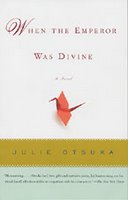2.3 When the Emperor Was Divine by Julie Otsuka

Before I was a surly teenager, my family would spend a week in Mammoth Lakes every other summer. We would drive there and in the six hour journey we went by Manzanar, one of the internment camps during World War II. My father was a school teacher and he told us about what happened to the people of Japanese descent. I was young and stupid and didn't really think about what "internment camp" meant. Now that I'm older and, hopefully, wiser, I get it. Part of me is incredulous that this happened here and the other part sees how very possible it is that this country's government tore a whole group of people away from their homes, stole their property and treated them like they were political prisoners just because of where they or their ancestors came from. And no one seemed to have a problem with it.
Emperor is the "Santa Barbara Reads!" choice for 2005, (as a side note, asking a city's populace to read just one book a year, isn't that challenging, nor is it going to improve the use of the library or literacy rates) which is probably why the library had twelve copies of it on Sunday. It follows the story of a Japanese-American family, a mother and her two children, who is sent away to a camp in Utah and what happens when they return to their home in Berkley. The father was brought in for "questioning" the night of Pearl Harbor and isn't seen for more than 4 years.
I think that Emperor has an identity problem. Except for a few gory parts in the beginning, I felt like this was mostly a children's book, albeit marketed for adults. It's short-ish, not as harsh as it could be, nor as intense. It seemed like the author was just about to get into the nitty-gritty at any moment, but backed off right away. For example, I thought that the mom was going to go crazy at the camp. She stared at walls, kept to herself and spoke in odd sentence fragments but when they get home, it's like none of that happened and she is back to normal.
The author tries to turn it back into an adult book with the final chapter but I felt like it was just confusing for confusion's sake. It gave more insight into how people might have felt but I wish the whole book was like that and two pages at the end aren't going to change that the reader doesn't learn much about the characters. I don't know if their blankness was intentional, that they could be any family that was forced into camps, that returned to find they weren't welcome in their old home, that were punished because of where they came from. The only part when that made any of them seem more real was when the little boy walks around whispering Hirohito's name just because he knows that he will get in trouble if he does and the sudden desire to do so.
There must be other books out there about this same topic. Any suggestions?

0 Comments:
Post a Comment
<< Home